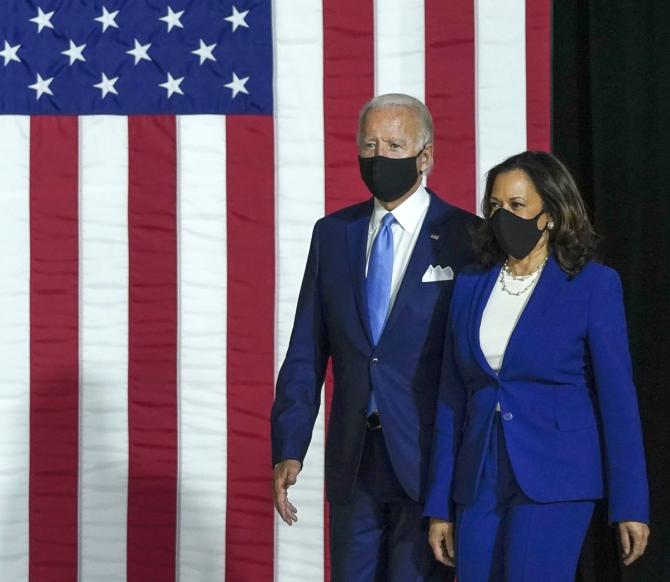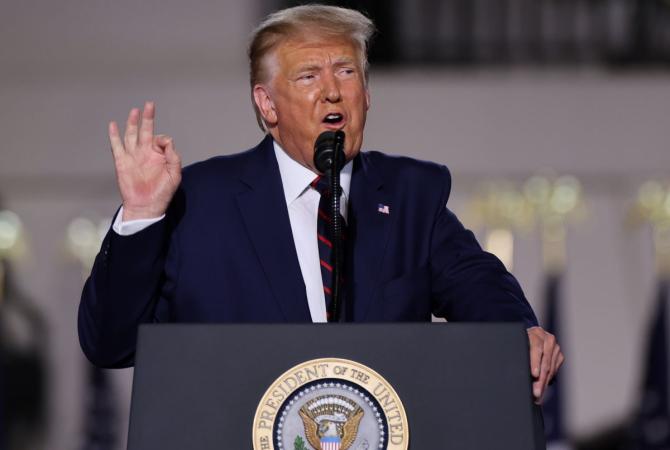The US is a wonderful example of how a political party with minority support can cling to power for decade, notes Devangshu Datta.

Though the Biden-Harris ticket leads the Trump-Pence ticket in opinion polls in many states, the race is not over till the fat lady sings. Photograph: Drew Angerer/Getty Images
Opinion polls indicate Joe Biden has a big lead in the presidential race. In addition, all 435 seats in the House of Representatives are up for grabs. The Democratic party is favourite to defend the majority it holds.
In the 100 seat Senate, 35 seats are up for re-election. Of these, 23 have Republican incumbents, while 12 are held by Democrats.
The Democrats need to win 16 of those 35 for a majority. If they win the presidential contest, even 15 Senate wins will do, since the Vice President (Kamala Harris in this scenario) has a casting Senate vote.
A Democratic majority in both Congress chambers aligned with the president would allow a rollback of many poor policies.
The US could pull back on irrational customs tariffs, ease up on work visas, stop separating asylum-seekers from children, change its income tax structure, reform a healthcare system which has failed signally to cope, and mend fences internationally with the many allies this administration has offended.
In addition, a Democratic administration could make a serious effort to tackle the pervasive combination of racism, and scientific illiteracy, which has been on display over the past four years.
But how likely is this hat-trick? There is no question the Democratic Party has more support. In a two-party system, that 'should' be enough.
But like all electoral systems, (vide Kenneth Arrow's Impossibility Theorem), America's can be gamed and indeed, it has been rigged to favour one party -- the Republicans.

The Electoral College offers disproportionate weightage to small states, as does the Senate. Alaska with about 1 million inhabitants has 2 Senators, as does California with over 30 million.
In terms of population, the larger states also have fewer electoral votes. Given Alaska has three, California should have around 90, but it has only 55. Meanwhile, Puerto Rico (4 million population) has no representation.
Calculations by pollsters indicate that per capita votes are severely magnified in impact in several small, extremely white states, which are Republican-dominated.
Overall, this further magnifies the impact of the white voter, in a country where whites anyhow comprise roughly 70 per cent of the electorate.
Every 10 years, the US holds a census, which is supposed to lead to re-weighting of the Electoral College numbers.
But the abrupt end to the 2020 Census by the Trump administration will mean that these demographic anomalies are not addressed, unless the next administration goes through with the Census anyway.
Another problem with the US electoral system is endemic gerrymandering. Re-districting as it is called, can be done to ensure that a minority vote translates into more seats.
To take a simple example, say there are two constituencies with a total of 10 voters. One party, 'A' wins 6 votes.
In a two-party, first-past-the-post system, if voters are evenly divided between constituencies, A wins both constituencies.
But if party B has been in charge of the administration, it may be able to redistrict so that 4 of the A voters are in one seat.
Then, B also wins a seat. A look at the HoR maps makes it obvious that complex versions of this gerrymandering has happened across many states.
The 2016 presidential election made waves because the loser, Hillary Clinton, actually won 2 per cent more of the popular vote. This should not have been surprising.
In the last eight presidential elections, Republicans have won the popular vote twice, in 1988 and 2004. But Republicans have lived in the White House through four terms.
The US is a wonderful example of how a political party with minority support can cling to power for decades despite a free press and an academy, which points out distortions loudly and repeatedly.
Managing this electoral 'miracle' is even easier in a multi-party system, where academics and mediapersons are thrown in jail for speaking truth to power.
Feature Presentation: Rajesh Alva/Rediff.com











